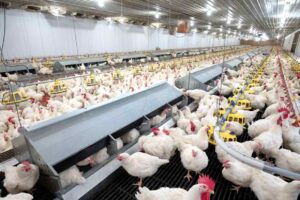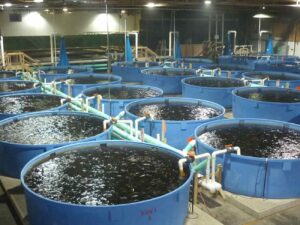Chicken is a widely eaten Nigerian delicacy consumed in many Nigerian homes. There is often an increase in demand for chicken in many Nigerian homes during the festive seasons such as New Year, Christmas and Easter celebrations. You can make fried chicken, chicken stew, chicken pie and many other meals using chicken. This has made the poultry farming business very lucrative.
If you start a poultry farming business in Nigeria, you are sure to have many customers such as hotels, restaurants, eateries and homes buying your chicken regularly. The poultry business in Nigeria is very profitable and might seem saturated, but there is a large demand for chicken all over the country; a demand that has not been met yet.
This is why the poultry business in Nigeria is a great business for you. Within eight months, you get to make a lot of money from your poultry business.
The best thing about starting a poultry farming business in Nigeria is that you can get so many by-products from poultry such as:
- Chicken meat
- Eggs etc
So, how do you start a poultry farming business in Nigeria?
How to start a poultry farming business in Nigeria
Start a poultry farming business in Nigeria with these steps.
1. Write a business plan
A business plan is essential when starting a poultry business in Nigeria. It helps you map out your overall strategy and plan for your business.
A business plan is a written depiction of your poultry farming business’s potential, a document that tells what you plan to do and how you plan to do it.
Writing a business plan ensures that you know;
- The cost of starting a poultry farming business in Nigeria
- The profit you will get from the business
- What you will need to start a poultry farming business in Nigeria
The business plan helps avoid eventual bumps on the road to your business success.
2. Raise capital
You need substantial capital to start a poultry farming business in Nigeria. The higher the capital investment you put into your poultry business, the higher the profit you stand to gain. You can get capital through;
- Loans
- Savings
- Contributions or cash gifts from family and friends
The amount of money you need to start a poultry business in Nigeria ranges from a hundred thousand naira to twenty million naira. It all depends on if you want to start your poultry farming business on a small scale or large scale.
3. Buy or lease farmland
You need a piece of land to start your poultry business. You can buy your own land if you can afford it or choose to lease farmland instead. Hire a lawyer to help you with the purchase or lease transaction to avoid horror stories. Make sure the farmland you buy or lease is suitable to rear chickens either on a small scale or on a large scale.
4. Choose a poultry system
You have to choose a suitable poultry system for your poultry farming business. There are two types of poultry systems for rearing chickens. They are;
- Battery cage system – This poultry system involves rearing chickens in cages.
- Deep litter system – This poultry system involves rearing chickens on a floor covered with sawdust.
Both poultry systems have their own pros and cons. The battery cage system is healthier for your chickens but more expensive to set up. The deep litter is not particularly healthy for your chickens but it is cheaper to set up. Choose the poultry system that suits your budget and is more preferable for you.
5. Decide the type of chicken you want to rear
When starting a poultry farming business in Nigeria, you have to choose the type of chicken you want to rear on your farm. There are two types of chickens;
- Layers – These type of chickens produce eggs
- Broilers – These type of chickens produce meat
You can on the other hand rear both layers and broilers at the same time. Therefore, you can get both chicken meat and eggs at the same time. However, rearing only layers or broilers is not bad either. Focusing on just one type of chicken to rear helps you focus on a definite type of production. Your customers know you either as the chicken meat seller or the egg seller. This helps you narrow down your target market and market to the right type of customers effectively.
You can also build a hatchery and solely focus on just breeding chickens for the purpose of hatching new chicks. It all depends on your end goal for your poultry farming business.
6. Build a structure to house your chickens
Build a housing structure for your chickens. If you want to utilize the battery cage system, you have to build cages. This is very essential for chicken rearing. You will be able to take care of your chicken properly.
7. Buy all necessary equipment for poultry farming
Buy poultry farming equipment you will need such as feeders, heaters, incubators, laying nests, egg scale, water pots, drinkers, egg washer and egg trays etc. These are all essential for rearing chickens on your poultry farm.
8. Start rearing your chickens
After following all the steps outlined above, it is the right time to start rearing your chickens. Your baby chicks have to be cared for properly to avoid harm or disease. Make sure the environment is conducive to their growth. Your chickens should be given food and water at all times. You should also bring a veterinary doctor to check their health from time to time.
9. Sell your chickens
When your chickens have fully matured, which is usually about eight months later, it is time to sell them to customers. Make sure you advertise your poultry farming business to all potential customers especially restaurants, eateries and canteens.
You are sure to make millions of naira from your poultry farming business if you have customers willing to buy your chicken meat or eggs. The poultry business is one of the most lucrative business opportunities in Nigeria. If done right, you will build a sustainable income from your poultry farming business.
You can find other opportunities at business opportunities.




